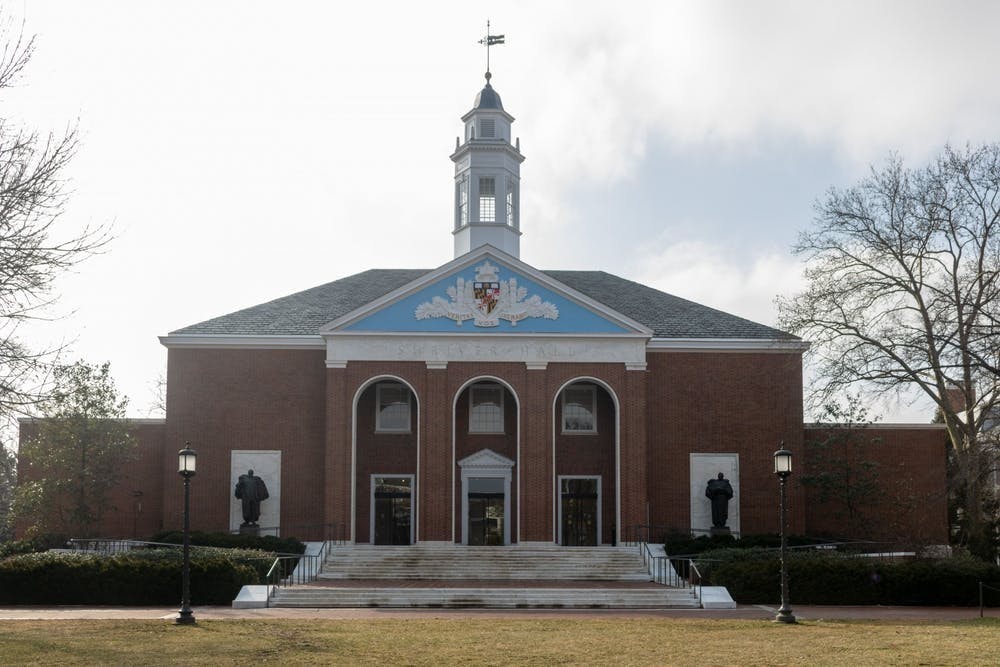The Student Government Association (SGA) met for the second time this summer on June 30 over Zoom. At the meeting, SGA voted unanimously to support renaming the Woodrow Wilson Fellowship and Gildersleeve House of AMR II in support of the Black Lives Matter movement. The group also signed the petition calling for the University to permanently end its plans for the Johns Hopkins Police Department (JHPD).
Executive President Sam Mollin noted that the petition has over 6,000 signatures. On June 12, administrators decided to postpone the implementation of the JHPD for at least two years.
“Instead of a two-year freeze, the petition is calling for a complete stop to the private police force,” he said. “I do not think it makes sense for the University to pursue this private police force when there are alternatives to policing that the University has chosen not to pursue.”
Sophomore Class President Anthony Singleton questioned possible alternatives to the JHPD. Although the faculty member scheduled to present on the petition did not attend the meeting, Mollin explained that one possible option is the Safe Streets Program. Through this program, trusted members of the community intervene when there are possible situations of violence.
SGA unanimously voted for Mollin to sign the petition on behalf of the group.
“We see a lot of the issues related to systemic racism are related to the police,” he said.
Junior Class President Nathan Mudrak introduced the resolution to rename the Woodrow Wilson Fellowship and the Gildersleeve House following Princeton University’s lead in removing Wilson’s name from its School of Public Affairs.
In November 2016, Nathan Connolly, a professor in the History Department, submitted a motion calling on administrators to rename the fellowship in light of the former U.S. president’s racist legacy. Connolly told The News-Letter in May 2019 that he and the Homewood Faculty Assembly were still waiting for an answer.
“This is an effort to not name things after racists,” Mudrak said. “The resolution asks that we involve students in the decision-making about the names that follow.”
SGA unanimously voted to pass the resolution, which was supported by the Black Student Union, African Student Association and Female Ladies of Color.
In addition, Senior Class Senator Ananya Kalahasti and Junior Class Senator Megan Chien introduced the reforms made to the Student Organization Liaison Procedure, including the suggestion to exclude first-year senators and specifying that Committee on Student Organizations (CSO) members would be assigned to three to four more organizations compared to other senators. These liaisons are intended to act as point persons in order for all student organizations to have a direct communication channel to SGA if they have any questions or concerns.
“We would like to exclude first-years because we feel they already have a lot on their plate with college life and adjusting to campus. They may not be as familiar with the procedures on campus, and they may not be able to answer questions as well as other senators,” Chien said.
Executive Secretary Breanna Soldatelli, however, expressed that she found it unfair to exclude freshmen from the process. She raised the point that the other new upperclassman SGA members would, like freshmen, be unfamiliar with procedures on campus and have to learn anyway.
“Personally, when I was a first-year and new to the school, I worked really hard to understand everything on CSO. Also, since freshmen do not have other commitments to orgs, they would be able to dedicate more time to this,” she said. “We also changed a lot about SGA this year, and all of us had to learn new things.”
Noting uncertainty surrounding the fall semester, Kalahasti clarified that excluding freshmen was not in the original bill but was considered as a possibility due to logistical issues, since SGA aims to pair all the liaisons over the summer. In this way, SGA can avoid having to re-pair organizations to SGA senators during the semester once the Freshman Class Council is elected.
Singleton suggested assigning freshman senators to a fewer number of organizations so as not to overwhelm them.
“Maybe having a reduced number of orgs for freshmen to oversee... so that it is not overbearing for them but they can still learn the process,” he said. “It would be a nice middle ground.”
Executive Vice President Mehak Ali echoed Singleton’s proposed solution and suggested for Chien and Kalahasti to add a friendly amendment to the bill. She also read some of the comments from the public on the issue, referring to the University’s recently released current plans for the fall semester.
“One person agreed that adding freshmen would be counterproductive because having to teach freshmen through hands-on experience in addition to dealing with COVID-19 might create more issues. Another person said that another thing to consider is that freshmen are the only ones with confirmed on-campus housing,” Ali said. “They will have the most access to on-campus clubs and could periodically take the load off of other senators.”
Mudrak added the friendly amendment to the bill to pair first-years with upperclassmen as primary and secondary liaisons for the student organizations. SGA unanimously voted to pass the bill.
Correction: The original version of the article stated that each senator would be paired with 3-4 organizations. However, Senator Ananya Kalahasti reached out to The News-Letter to clarify that members of the Committee on Student Organizations (CSO) would be paired with 3-4 more organizations compared to other senators. The News-Letter has amended this error.





